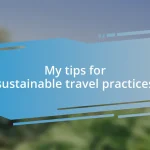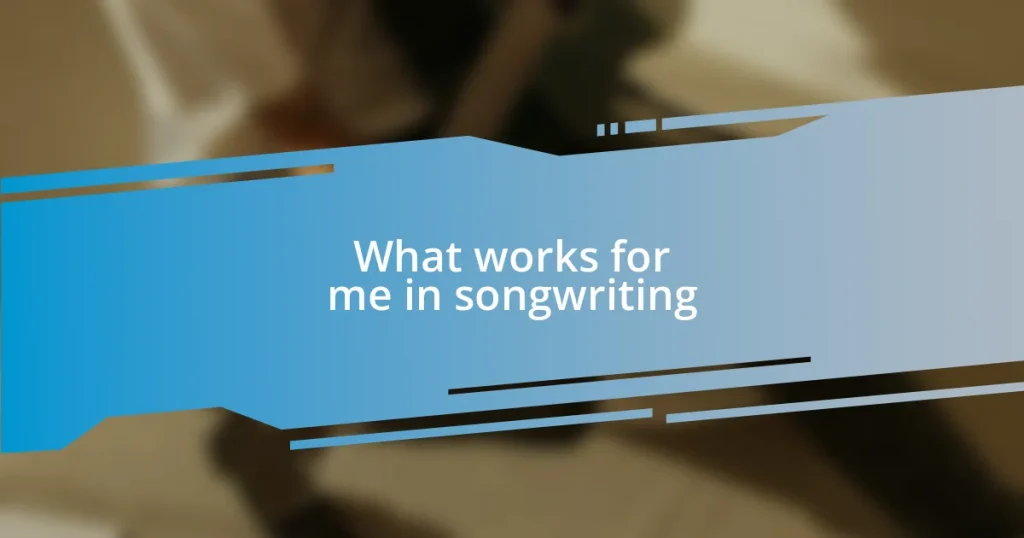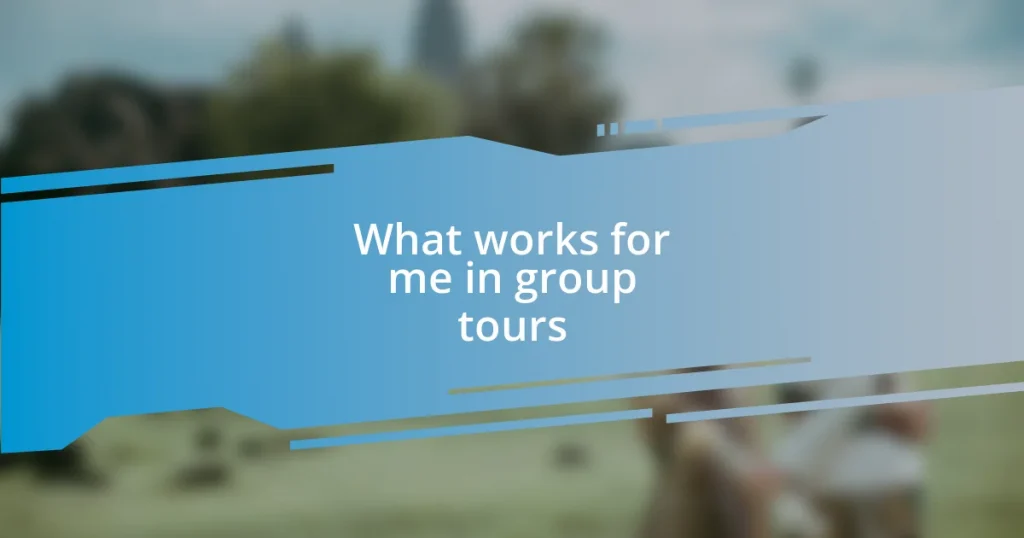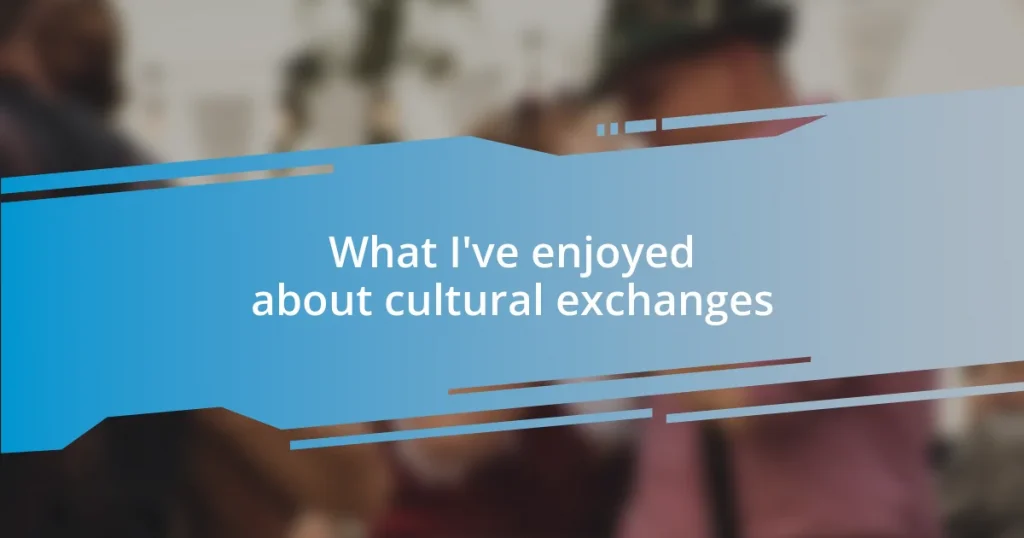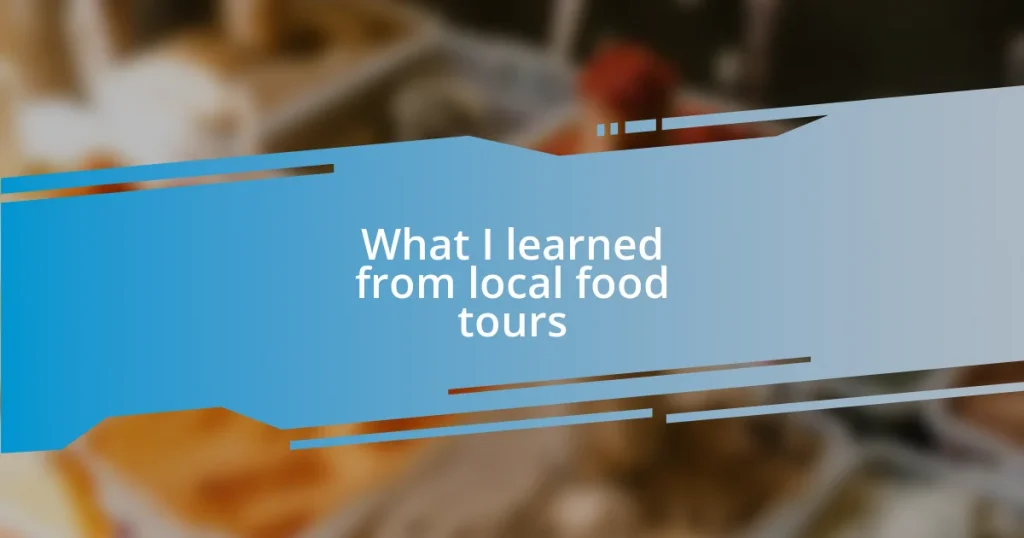Key takeaways:
- Songwriting starts with inspiration from emotions or everyday experiences, leading to a dynamic interplay between lyrics and melody.
- Overcoming writer’s block involves techniques like changing environments, free writing, and collaborating with others to stimulate creativity.
- Refining songs is crucial for enhancing emotional impact, often involving feedback from peers and revisiting lyrics to deepen the narrative.
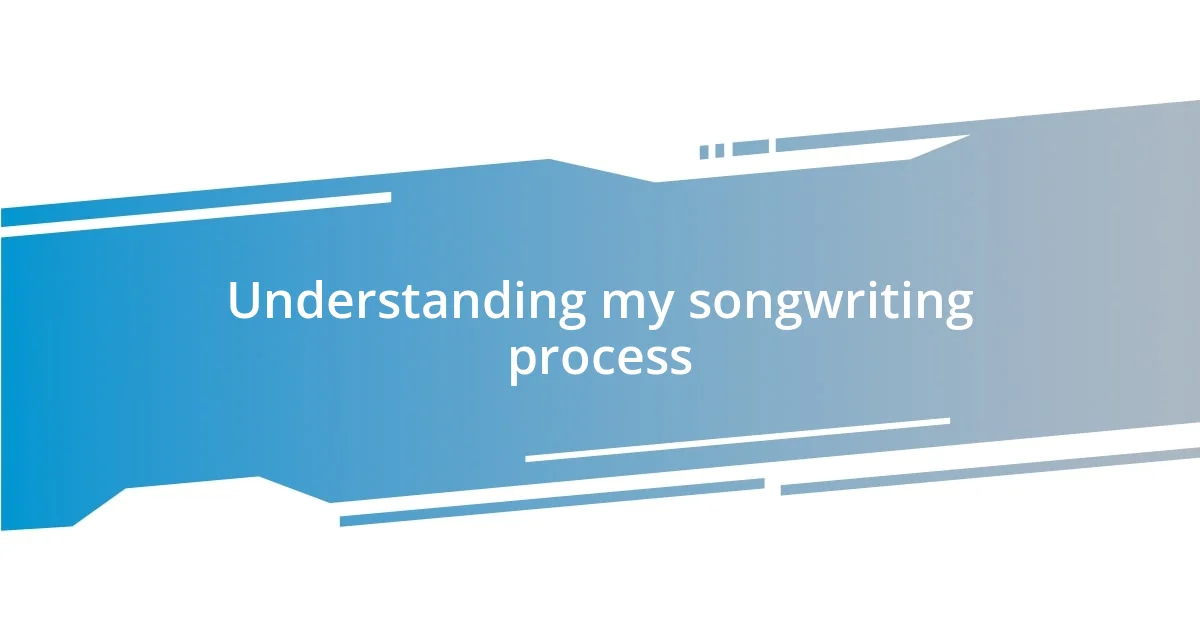
Understanding my songwriting process
Songwriting for me often begins with a spark—an emotion or image that lingers in my mind. I remember one evening when a particularly vivid sunset inspired the chorus of a song I wrote. Isn’t it fascinating how something as simple as the colors in the sky can translate into music?
Once that spark ignites, I dive into the lyrics. I find myself scribbling countless phrases, often late into the night, sometimes pausing to wonder if this line truly captures the feeling I’m after. Have you ever found yourself stuck at a crossroads while writing? I do. But I’ve learned that even when I hit that wall, taking a deep breath and stepping outside for a walk clears my mind, allowing new ideas to surface.
When the melodies come together, I feel a rush of excitement. I can still recall the thrill of piecing together a song while strumming my guitar, feeling every chord resonate with my emotions. This back-and-forth dance between lyrics and melody feels almost like a conversation with myself, as I explore different themes and emotions. It makes me realize that each song is not just music; it’s a glimpse into my soul.
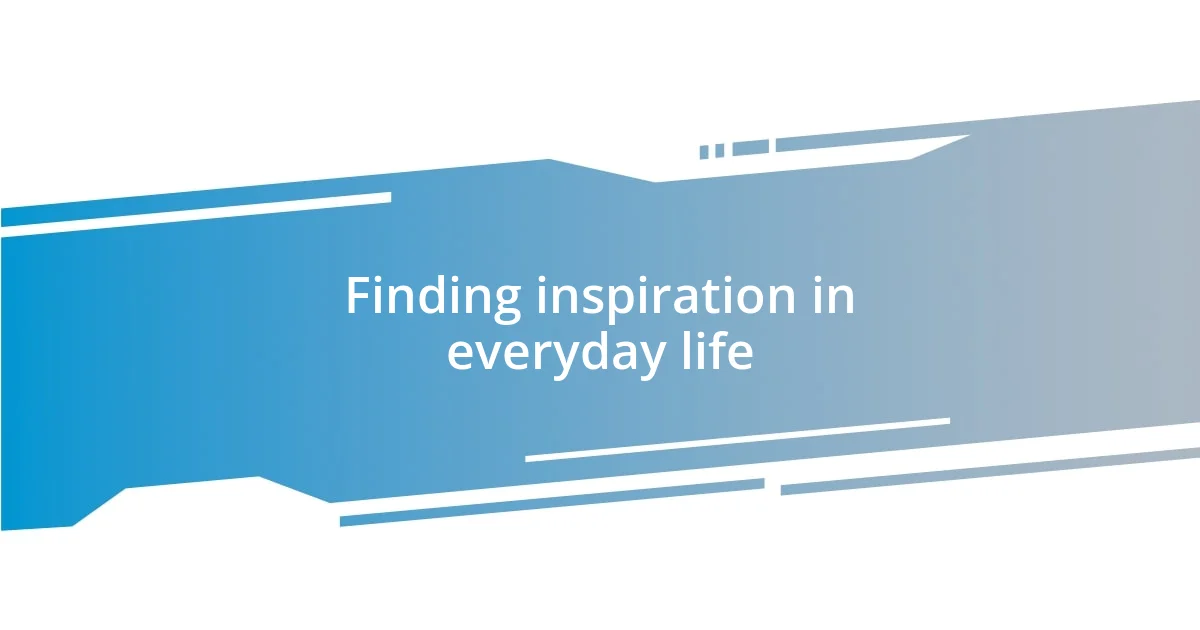
Finding inspiration in everyday life
Finding inspiration in everyday life has become a treasure hunt for me. Just this morning, while waiting for my coffee, I overheard a couple’s playful banter that sparked the idea for a fun, upbeat song. It’s incredible how the mundane can transform into something extraordinary if you open your eyes and ears to the world around you. Everyday interactions, simple observations, and even routine sounds can weave their way into lyrics or melodies.
Here are a few sources of inspiration I often tap into:
- Nature’s rhythm: The sound of rustling leaves or the way rain dances on pavement can evoke strong feelings.
- Conversations: A brief chat with a stranger can reveal emotional depths or universal truths.
- Memories: Reflecting on small moments from my past can unlock a wave of creative energy.
- Art and literature: A captivating book or a striking painting can offer fresh perspectives and ideas.
- Daily routines: Embracing the familiar rhythms of my day often leads to unexpected revelations.
These snippets of life remind me that inspiration isn’t just found in grand moments but in the subtle beauty of everyday experiences.

Techniques for overcoming writer’s block
Overcoming writer’s block is a challenge every songwriter faces at some point. One technique that works wonders for me is changing my environment. I once found myself stuck at home, staring at my blank page. So, I grabbed my notebook and headed to a nearby park. The moment I sat under a tree, the fresh air and sounds of nature sparked new ideas, and before I knew it, the lyrics started flowing again. Sometimes, a change of scenery is all it takes to jumpstart creativity.
Another method I often use is free writing. I set a timer for 10 minutes and write whatever comes to mind, no matter how random or disjointed it may seem. This technique allows my thoughts to flow without judgment. It’s surprising how many hidden gems appear once I break that initial hesitation. On one occasion, I wrote about an entirely different subject, yet a line emerged that became the chorus of a future song. It taught me that even if I’m not writing directly about my intended topic, there’s no such thing as wasted time in creativity.
Collaborating with other musicians is also a fantastic way to overcome creative blocks. One day, I sat down with a friend who plays the piano, and we spent hours improvising together. The synergy lifted my spirits, and we built a song piece by piece, inspired by each other’s ideas. This experience reinforced my belief that sharing the creative process can open doors and lead to unexpected musical pathways.
| Technique | Description |
|---|---|
| Change of Environment | Switching locations to spark new ideas (e.g., writing in nature). |
| Free Writing | Writing continuously for a set time to unblock thoughts without self-criticism. |
| Collaboration | Working with others to create music together and inspire fresh concepts. |
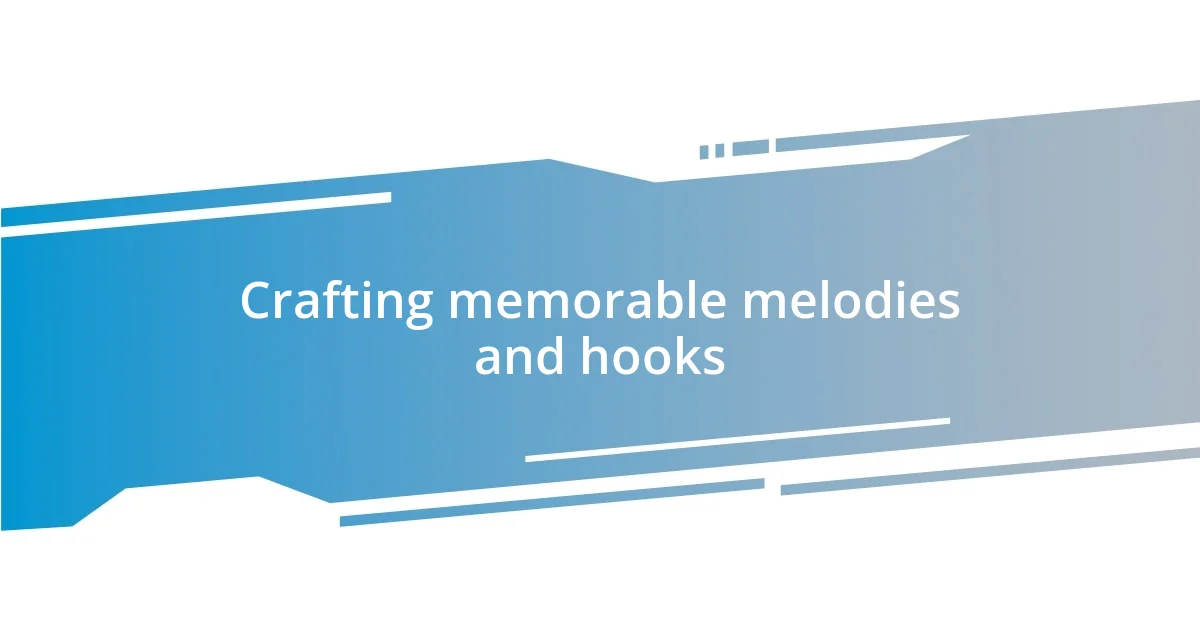
Crafting memorable melodies and hooks
When it comes to crafting memorable melodies and hooks, I find that simplicity often leads to the most impactful moments. A few years ago, I stumbled upon a catchy three-note phrase while showering—yes, the shower! It struck me as so delightful that I hurried to my guitar, and within minutes, I had the foundation of a song. Sometimes, it’s the most unexpected situations that can lead to those “earworm” melodies that stick with listeners long after the song ends.
Another strategy I use is to play with rhythm and phrasing. I remember writing a hook for a song that was completely off the beaten path. Instead of sticking to a standard pattern, I experimented with syncopation—placing emphasis on beats in unexpected places. This gave the melody a unique swing that listeners found instantly engaging. Have you ever noticed how certain melodies just lift you up? That rhythmic twist can truly transform a simple idea into something lively and memorable.
It’s also important to ensure that the hook resonates emotionally. One time, I was grappling with a breakup and found myself writing a chorus that encapsulated that raw pain. The honesty of those lyrics paired with a soaring melody I had created really captured the struggle I was feeling. When I performed it live, the crowd connected deeply, showing me how an emotionally charged hook can create a powerful bond with listeners. Isn’t it fascinating how a melody can speak volumes, transcending language and touching hearts?
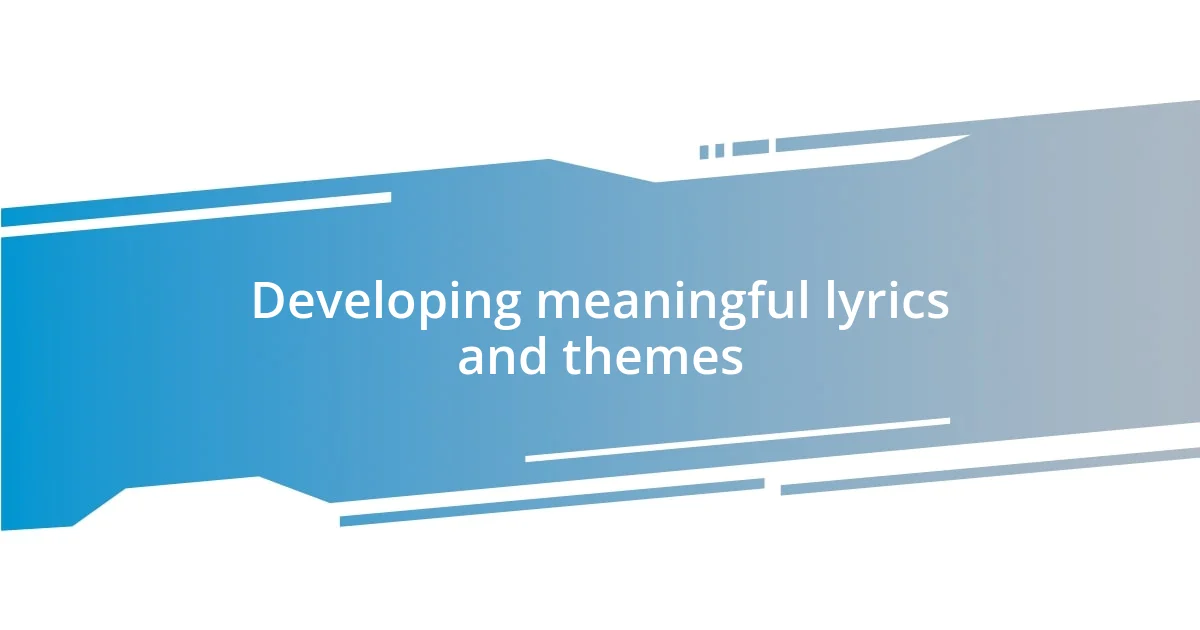
Developing meaningful lyrics and themes
Developing meaningful lyrics and themes is a personal journey for every songwriter, and I’ve found that drawing from real-life experiences creates authenticity. One afternoon, while reminiscing over old photographs, I began writing lyrics about lost friendships and inevitable change. The words flowed easily, and it hit me how powerful it felt to weave my memories into a song. Have you ever noticed how a single moment can inspire an entire narrative? That connection to our own stories makes the lyrics resonate.
I also like to explore various perspectives when tackling themes. For example, I once wrote a song that addressed hope but took it from the viewpoint of a child facing uncertainty. I imagined their innocent way of seeing the world, which opened up a vein of creativity I hadn’t tapped into before. It was almost like wearing a different hat. By considering different angles, I enriched the narrative and evoked stronger emotions. How often do we limit ourselves to just one perspective in songwriting?
Lastly, creating a strong thematic thread throughout a song can elevate it to another level. When I wrote a piece centered around the concept of escape, I incorporated imagery that painted a vivid landscape of freedom—like the ocean and open roads. Each verse built upon that theme, crafting a sense of yearning that I hope listeners relate to. It made me realize that a cohesive theme not only amplifies the message but also invites the audience to immerse themselves fully in the journey. What themes have you explored, and how have they shaped your songs?
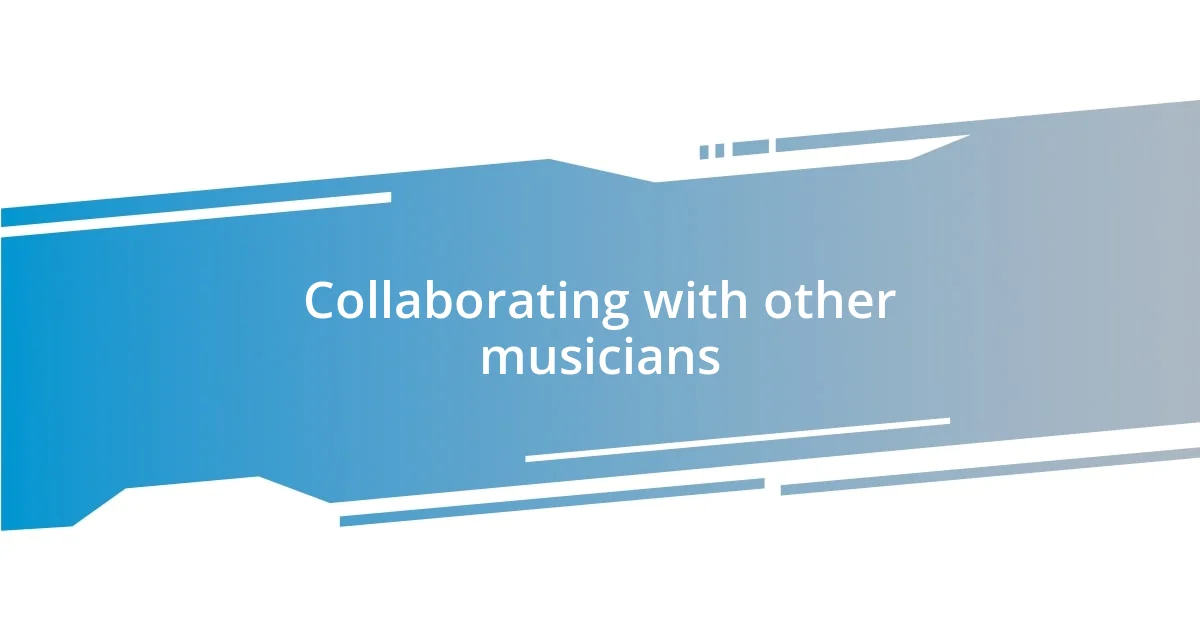
Collaborating with other musicians
Collaborating with other musicians has been an exhilarating experience in my songwriting journey. I remember my first co-write; it was nerve-wracking yet exciting. We each brought our own ideas, and it felt like magic as our thoughts blended into something cohesive. Have you ever experienced that moment when a simple exchange of musical ideas leads to a richer outcome than you could achieve alone? It’s like combining flavors in cooking—sometimes, the right blend creates a dish that’s a surprise delight!
In one memorable session, I teamed up with a pianist who had a completely different style than mine. At first, I felt like we were speaking different musical languages. But as we dove deeper into the songwriting process, I discovered how her lush chord progressions complemented my straightforward melodies. This contrast not only expanded my creative horizons but also taught me the power of embracing diversity in collaboration. How often do we limit our creativity by sticking to what we know? Finding common ground with another musician can truly broaden your artistic scope.
Moreover, collaborating opens doors to fresh perspectives and unexpected emotions. I once worked with a friend on a song designed for a local charity event. Together, we explored themes of hope and community, channeling our shared experiences into the lyrics. The end result felt deeply rooted in both of us, almost like a conversation between our ideas. I realized that when we create together, we not only craft new music but also build connections that resonate with listeners. Have you had a similar experience where collaboration ignited something special in your songwriting?
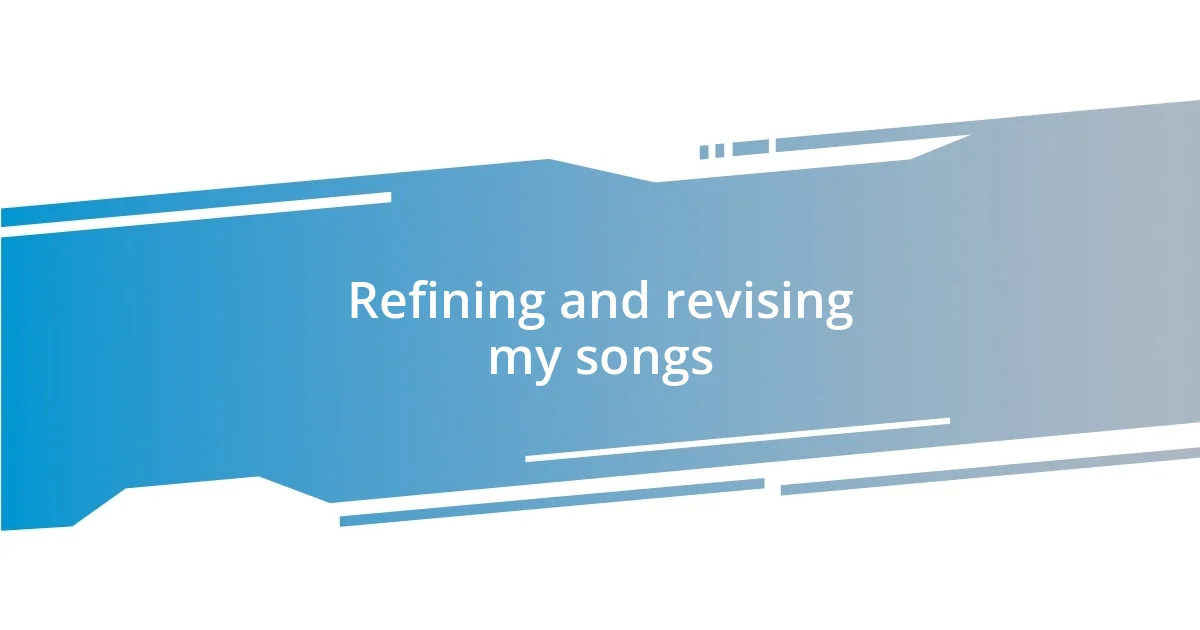
Refining and revising my songs
Refining and revising my songs is a process that often feels like sculpting a statue from a block of marble. Initially, I might write a song with raw energy, and then I step back, letting it sit for a bit. By doing this, I often discover areas that need smoothing out. For instance, after a few days of listening to a rough draft, I noticed that one chorus felt repetitive and lacked punch. It was a revelation—sometimes, distance gives you clarity. Do you ever find that taking a break from your work improves your perspective?
My revision process is often guided by feedback from trusted friends. One time, I shared a heartfelt ballad with a close musician friend who offered some candid thoughts on the bridge. At first, I felt defensive, but then I realized how valuable that outside perspective was for strengthening my song. I reworked the section, incorporating his suggestions, and it transformed the entire piece. Have you ever had feedback that challenged you but ultimately enriched your work? It can be tough to hear criticism, but I’ve learned it’s a vital part of growth.
Finally, I find revising isn’t just about cutting and rearranging lyrics; it’s about deepening the emotional impact of the song. Recently, I revisited a track that tackled difficult subjects, and while analyzing it, I realized the imagery wasn’t as evocative as it could be. I rewrote a few lines, adding visceral details that made the listener feel the weight of the experience. This shift made my song resonate more personally. Do you regularly refine your lyrics to enhance the emotional journey for your listeners? It’s these nuances that can elevate a good song into something truly compelling.








